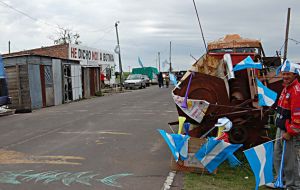MercoPress. South Atlantic News Agency
Mujica and Cristina Meet to Trade Apologies, Pickets and an Inconvenient Situation
 Pickets have promised to continue with their protest
Pickets have promised to continue with their protest Uruguay and Argentine presidents will be meeting Wednesday in Buenos Aires to analyze the aftermath of the International Court of Justice judgement on the pulp mills controversy and hopefully find a way, to peacefully lift Argentine protestors’ pickets that have been blocking since 2006 a bridge linking the neighbouring countries.
Although both José Mujica and Cristina Kirchner had agreed beforehand that they would strictly abide the Court’s judgement, the Uruguayan President is expected to insist that Argentina comply with Mercosur rulings regarding the free movement of people and goods, since the current situation (with pickets) “is not compatible with the founding charter commitment”.
This position apparently was agreed at Uruguay Monday’s weekly cabinet meeting, which is only a continuation of Mujica’s long established policy of trying to approach and convince the pickets, but so far unsuccessful.
Faced with Uruguay’s insistence that pickets from Gualeguaychú, across from where the pulp mill was built on the Uruguayan side, must come to an end, Argentina will try to invert the situation asking President Mujica to openly apologize for Uruguay’s reiterated violation of the River Uruguay Treaty that, since the seventies, manages the shared water course, according to the Buenos Aires press.
Following The Hague's ruling, which mentions Uruguay’s attitude of not communicating or informing Argentina of pulp mills’ plans, reports indicate that Mrs. Kirchner approach to the problem will be to ask for an official public apology. “We believe the meeting is a good opportunity for the fresh start of a political relation based on trust and in good faith negotiations”, La Nación reports quoting Casa Rosada sources.
Argentina also insists that in the judgement, the Court mentions ten times in which Uruguay failed to report its activities to Argentina, and claims one of them was committed by former President Tabaré Vázquez in “bad faith”.
Nevertheless, both sides—contrary to what was the case with ex president Vazquez—have a greater predisposition to talk, negotiate and find a way out to the on-going dispute. Mrs. Kirchner is hopeful that an official apology from the Uruguayan president will help in the arduous task of convincing the protestors from Gualeguaychú to lift the pickets blocking the bridge.
On Sunday, Uruguay’s Foreign Affairs Minister Luis Almagro advanced in a long Sunday interview that for the Mujica administration it was a “priority” to have the bridge cleared and open to traffic. The Argentine Government is also concerned about the massive concentration last Sunday on the blocked bridge, which protested against the ICJ's ruling and the Government’s acceptance of the situation which “is equivalent to surrendering to Uruguay (that knowingly) ignored the treaty”.
Argentine Cabinet Chief Aníbal Fernández met on Monday with the Governor of Entre Ríos, the mayor of Gualeguaychú and one of the province’s federal senators to consider the situation. Anyhow, participants downplayed the relevance of the meeting and said they discussed the mounting of an environmental lab as suggested by The Hague to jointly monitor water and air in the area of influence from the pulp mill.
Entre Ríos Governor Sergio Urribarri said the federal government was closely following the situation and reiterated no force would be used to clear the bridge. “The cut bridge will be solved with time. It’s not a central issue: the central issue is the pulp plant.”
Uruguayan sources anticipated that, besides confirming compliance with the Court’s ruling and an institutional response to the situation, President Mujica wants to talk about blocked export licences to Argentina, the price of Bolivia’s natural gas which has to cross mostly Argentine territory and the dredging of the Martin Garcia channel, one of the two which ensure River Plate navigability and access to the ports of Montevideo, Nueva Palmira and Buenos Aires.
With a more pragmatic approach, Uruguayan sources said that “sooner or later, even if they want to avoid rough moments, Mujica and Cristina will end up talking about the pickets and how to remove them”.




Top Comments
Disclaimer & comment rules-

-

Read all comments” .... which protested against the ICJ's ruling and the Government’s acceptance of the situation which “is equivalent to surrendering to Uruguay (that knowingly) ignored the treaty”.
May 01st, 2010 - 04:40 am 0Well it seems that at least the pickets recognise which side 'won' :-)
First they were protesting for pollution.
May 06th, 2010 - 02:54 am 0there is none.
So now they protesting because Uruguay violated the treaty.
which is also not 100 % truth -
what will be next?
it rains more on the other side?
Commenting for this story is now closed.
If you have a Facebook account, become a fan and comment on our Facebook Page!